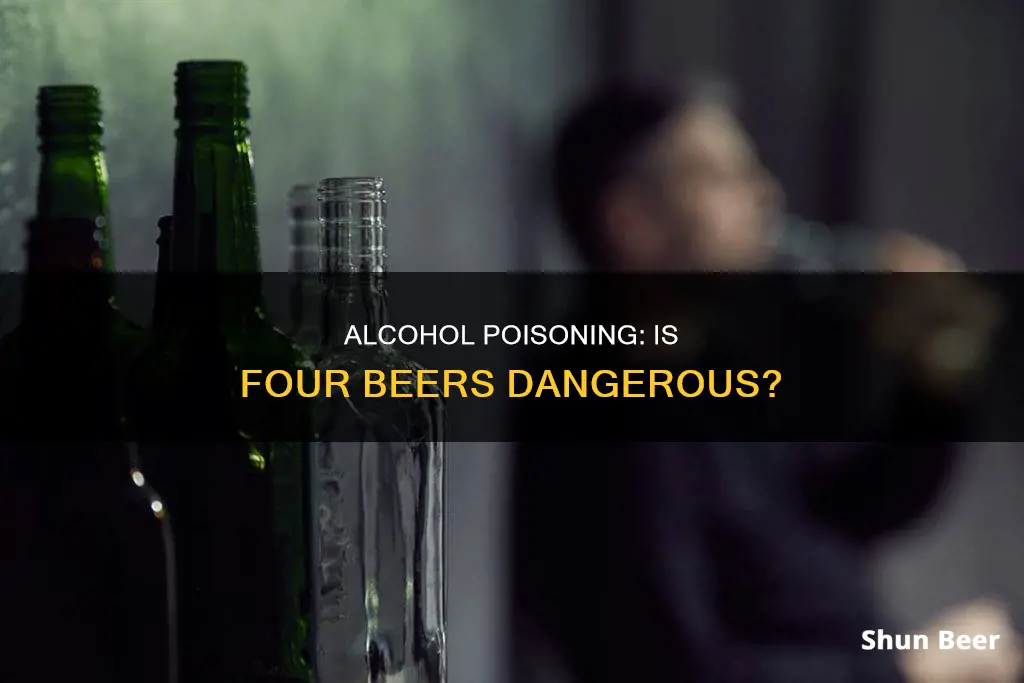
Alcohol poisoning is a dangerous and life-threatening condition that occurs when there is too much alcohol in the bloodstream, causing areas of the brain that control basic life-support functions to shut down. While the amount of alcohol that can lead to alcohol poisoning varies from person to person, drinking four beers in a short period can put one at risk. This is especially true for individuals who engage in binge drinking, which is defined as a woman consuming four drinks or a man consuming five drinks in about two hours. Recognizing the signs of alcohol poisoning and seeking immediate medical attention is crucial, as it can lead to permanent brain damage or even death.
| Characteristics | Values |
|---|---|
| Number of beers | 4 |
| Blood Alcohol Concentration (BAC) | 0.08% |
| Alcohol Poisoning | Unlikely but depends on various factors |
| Factors | Age, weight, gender, tolerance, speed of drinking, medications, amount of food eaten |
| Symptoms | Mental confusion, difficulty remaining conscious, slowed or irregular breathing, clammy skin, low body temperature, nausea, vomiting, seizures, trouble breathing, slow heart rate, dulled responses, bluish skin colour, loss of consciousness, choking on vomit |
| Treatment | IV fluids, oxygen therapy, stomach pumping, blood filtration, medical attention |
| Prevention | Avoid binge drinking, drink water, avoid drinking on an empty stomach, do not mix alcohol with medications |
What You'll Learn

Factors that influence alcohol tolerance
Alcohol tolerance refers to how much alcohol a person can consume before feeling its effects. Tolerance varies from person to person and is influenced by various factors, including:
- Amount of Alcohol and Speed of Consumption: The more alcohol consumed and the shorter the time period, the higher the Blood Alcohol Content (BAC). Binge drinking, which is consuming enough alcohol to reach a BAC of 0.08% or higher, increases the risk of alcohol poisoning.
- Biological and Genetic Factors: Individuals with a family history of alcoholism have an increased risk of developing alcoholism themselves. Additionally, certain ethnic groups, such as those of Asian or Native American descent, have reduced levels of alcohol dehydrogenase, an enzyme that metabolizes alcohol, leading to higher concentrations of alcohol in the blood.
- Sex and Body Composition: Women tend to have lower levels of alcohol dehydrogenase, resulting in alcohol remaining in their bloodstream longer. They also tend to have a higher percentage of body fat, which affects alcohol distribution. Smaller individuals, regardless of gender, will generally become impaired more quickly.
- Food Intake: Consuming alcohol on an empty stomach increases the risk of alcohol poisoning. Food in the stomach slows the absorption of alcohol into the bloodstream, and larger meals closer to drinking can lower the peak BAC.
- Carbonated Beverages: Carbonation speeds up the absorption of alcohol. Mixing alcohol with carbonated drinks or beverages containing stimulants, such as energy drinks, can lead to faster intoxication and mask the effects of alcohol.
- Health and Lifestyle Factors: Factors such as lack of sleep, strong emotions, stress, and existing health conditions can influence alcohol tolerance. Additionally, certain medications and drugs can interact with alcohol, altering its effects and increasing the risk of adverse outcomes.
While the above factors play a significant role in determining alcohol tolerance, it's important to remember that everyone is different, and there is no safe level of alcohol use. The effects of alcohol can vary widely, and even drinking within low to moderate limits can increase the risk of negative health consequences.
BeerSmith Compatibility: Apple Devices and Beyond
You may want to see also

How to identify alcohol poisoning
Alcohol poisoning can be life-threatening and requires immediate medical attention. It occurs when there is so much alcohol in the bloodstream that it starts to affect life-supporting functions such as breathing, heart rate, and consciousness. Here are some ways to identify alcohol poisoning:
- Mental Confusion and Slowed Responses: Signs of alcohol poisoning include mental confusion, stupor, and slowed responses. The affected person may have difficulty speaking, slurring their words, or becoming unresponsive.
- Lack of Coordination: Alcohol poisoning can result in the inability to coordinate movement, such as standing, walking, or picking things up.
- Difficulty Remaining Conscious: Alcohol poisoning can lead to difficulty in staying awake and maintaining consciousness. If the person is unconscious, they are at risk of choking on their vomit, which can be life-threatening.
- Slow or Irregular Breathing: Watch for slow (less than eight breaths per minute) or irregular breathing patterns. This is a critical sign of alcohol poisoning.
- Hypothermia and Skin Discoloration: Alcohol poisoning may cause extremely low body temperature (hypothermia) and changes in skin colour, such as paleness, clamminess, or bluish skin, especially around the lips and fingernails.
- Bladder or Bowel Control Issues: Incontinence, or the inability to control urination or defecation, is another symptom of alcohol poisoning.
- Gag Reflex and Choking: Alcohol poisoning can affect the gag reflex, increasing the risk of choking on vomit. If the person is unconscious, ensure they are turned on their side to prevent choking.
If you suspect someone is experiencing alcohol poisoning, call for emergency medical assistance immediately. Do not wait for all the symptoms to appear, as quick action is crucial. While waiting for medical help, keep the person awake, sitting or partially upright on the ground, and provide them with water to sip if they are conscious. Keep them warm and monitor their breathing.
Organic Beer and Gout: Is It Safe to Drink?
You may want to see also

What to do if someone has alcohol poisoning
Alcohol poisoning occurs when there is so much alcohol in the bloodstream that it starts to affect life-supporting functions such as breathing, heart rate, and consciousness. It is a life-threatening condition that requires immediate medical attention.
If you suspect someone is experiencing alcohol poisoning, here are some steps you can take:
- Act quickly: Don't wait for all the symptoms to appear or for the person to pass out.
- Call emergency services: In the US, call 911 immediately. In other countries, call the local emergency services number.
- Collect information: While waiting for emergency services, gather as much information as possible, such as the amount and type of alcohol consumed, any medications or substances taken, existing health conditions, and allergies.
- Position the person safely: Place them on the ground in a sitting or upright position to prevent choking and falls.
- Monitor their breathing and vomiting: Keep them awake and encourage them to lean forward to prevent choking. If the person is unconscious, place them on their side with an ear to the ground to prevent choking if they vomit.
- Keep them warm: Alcohol poisoning can cause a drop in body temperature, so cover them with a blanket.
- Explain your actions: Communicate your actions to the person to prevent confusion or aggression.
- Stay with them until help arrives: Continue monitoring their condition and be ready to provide information to paramedics when they arrive.
Remember, alcohol poisoning is a medical emergency. Do not try to treat it at home or wait for the person to "sleep it off." Always seek professional help as soon as possible.
Hopsy Beer: How Does the Freshness Work?
You may want to see also

How to avoid alcohol poisoning
Alcohol poisoning is a dangerous and potentially fatal result of consuming large amounts of alcohol in a short amount of time. It occurs when there is so much alcohol in the bloodstream that it starts to affect life-supporting functions, such as breathing, heart rate, and consciousness. To avoid alcohol poisoning, follow these important tips:
- Stay away from drinking games: These activities can distract players and encourage them to drink more than they realise. They can also lead to risky behaviour, aggression, and peer pressure.
- Maintain hydration: Alcohol is a diuretic, which means it causes you to urinate more frequently. Drinking water before and during an alcohol session can help prevent dehydration and its severe consequences.
- Eat before and while drinking: Food in the stomach, especially protein, slows down the absorption of alcohol into the bloodstream. This minimises the side effects of drinking and reduces the risk of alcohol poisoning.
- Avoid mixing alcohol with medication: Alcohol can make medications less effective or worsen their side effects. Certain medications may also contain ingredients that can react dangerously with alcohol. Always check with your doctor or pharmacist if you are unsure.
- Be vigilant: Staying alert while drinking encourages self-awareness and helps you make clear-headed decisions about your alcohol consumption.
- Pace and space your drinks: Sip your drink instead of chugging. Alternate with non-alcoholic beverages and stick to no more than one drink per hour.
- Avoid "mega" drinks: Cocktails such as Long Island Iced Tea, AMF, Margaritas, or Kamikazes contain five or more times the alcohol of a standard drink.
- Use a designated driver: Agree on a designated driver before going out, and make sure they stick to non-alcoholic drinks.
- Be cautious when sick or tired: When you're sleep-deprived or unwell, alcohol leaves the body more slowly.
- Set your limit before you start: Consider your plans for the next day and the impact that alcohol may have on your ability to perform certain tasks.
Remember, the only truly safe choice is to avoid alcohol altogether. If you choose to drink, always practise moderation and be mindful of your consumption and its effects on your body.
Beer and Sudafed: Safe Mix or Health Risk?
You may want to see also

Alcohol poisoning treatment
It is important to note that the amount of alcohol a person can consume before experiencing alcohol poisoning varies from person to person. Factors such as age, drinking experience, gender, food intake, and ethnicity can influence this. Binge drinking, which is associated with several health risks, is defined as consuming enough alcohol to bring your BAC to 0.08% or higher. For women, this typically occurs after four drinks in about two hours. However, this does not mean that drinking fewer beers guarantees safety from alcohol poisoning.
If you suspect someone is experiencing alcohol poisoning, it is crucial to act quickly. Here are some steps to take:
- Call emergency services: If you suspect alcohol poisoning, don't wait for all the symptoms to appear or for the person to pass out. Tactics like hot coffee, walking, or cold showers will not reverse the effects of an alcohol overdose. Call 911 or your local emergency number immediately.
- Collect information: While waiting for emergency services, gather as much information as possible. This includes the amount and type of alcohol consumed, any other substances or medications taken, existing health conditions, and medication allergies.
- Position the person safely: Place the person on the ground in a sitting or upright position to prevent choking and falls. If they are vomiting, encourage them to lean forward to avoid choking. If they are lying down or unconscious, place them on their side with an ear to the ground to prevent choking on vomit.
- Monitor breathing and consciousness: Keep a close eye on the person's breathing and level of consciousness. Alcohol poisoning can cause slow or irregular breathing and difficulty remaining conscious.
- Keep the person awake: Try to keep the person awake and responsive. However, if they are unconscious, do not give them anything to drink as they may choke.
- Keep the person warm: Alcohol poisoning can lead to a low body temperature, so cover the person with a blanket to help regulate their temperature.
In a medical setting, healthcare professionals will provide treatment for alcohol poisoning, which may include:
- IV fluids: Intravenous fluids are administered to treat dehydration and increase blood sugar levels if they are low.
- Oxygen therapy: Oxygen is provided through a nasal cannula or a small tube inserted into the windpipe if the person has trouble breathing.
- Stomach pumping: In some cases, a tube may be used to remove toxins from the stomach.
- Blood filtration: If the person's kidneys are not functioning properly, dialysis may be started to filter alcohol from the blood.
Beer and Niacin: What's the Safe Combination?
You may want to see also
Frequently asked questions
It depends on various factors, including your weight, age, sex, and how quickly you drank the beers. Generally, binge drinking is considered a significant risk factor for alcohol poisoning, and it is defined as a woman consuming four drinks or a man consuming five drinks in about two hours.
Symptoms of alcohol poisoning include mental confusion, difficulty remaining conscious, slowed or irregular breathing, clammy or bluish skin, low body temperature, seizures, vomiting, and dulled responses such as a lack of gag reflex.
If you suspect someone is experiencing alcohol poisoning, call 911 immediately. Do not wait for all the symptoms to appear, and do not try home remedies such as hot coffee or cold showers, as they do not reverse the effects of alcohol overdose.
To prevent alcohol poisoning, limit your alcohol consumption, drink responsibly, and stick to guidelines for moderate drinking. Eat before or while drinking, stay hydrated, and avoid drinking games and mixing alcohol with medications or other substances.







